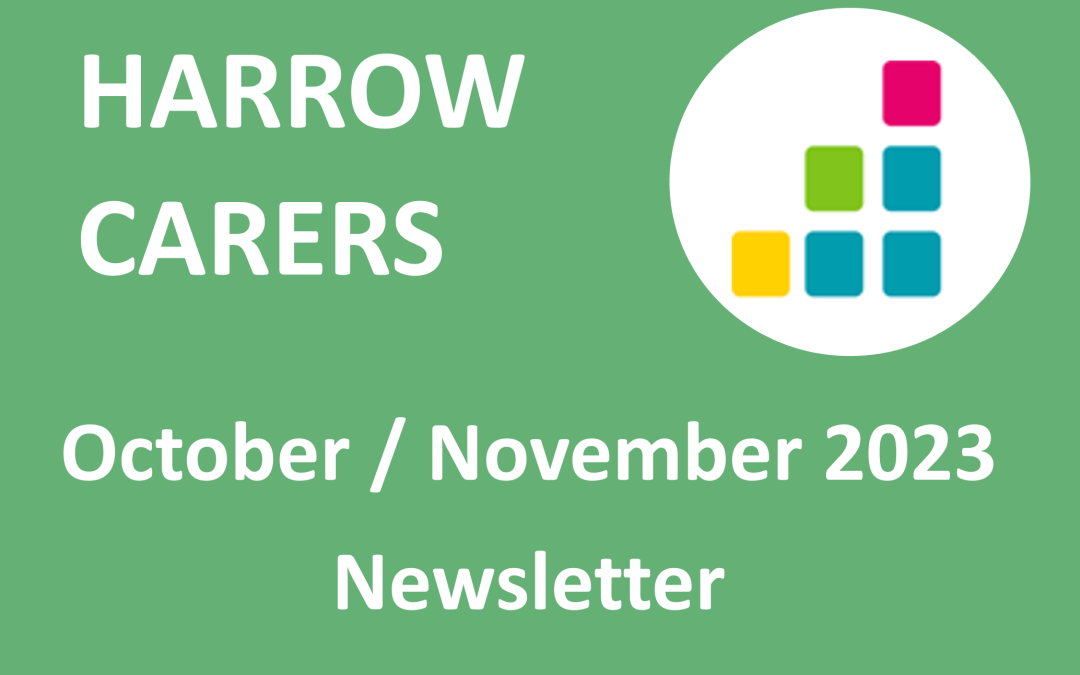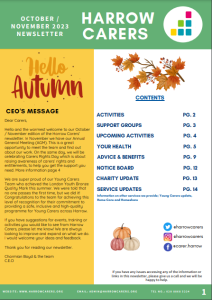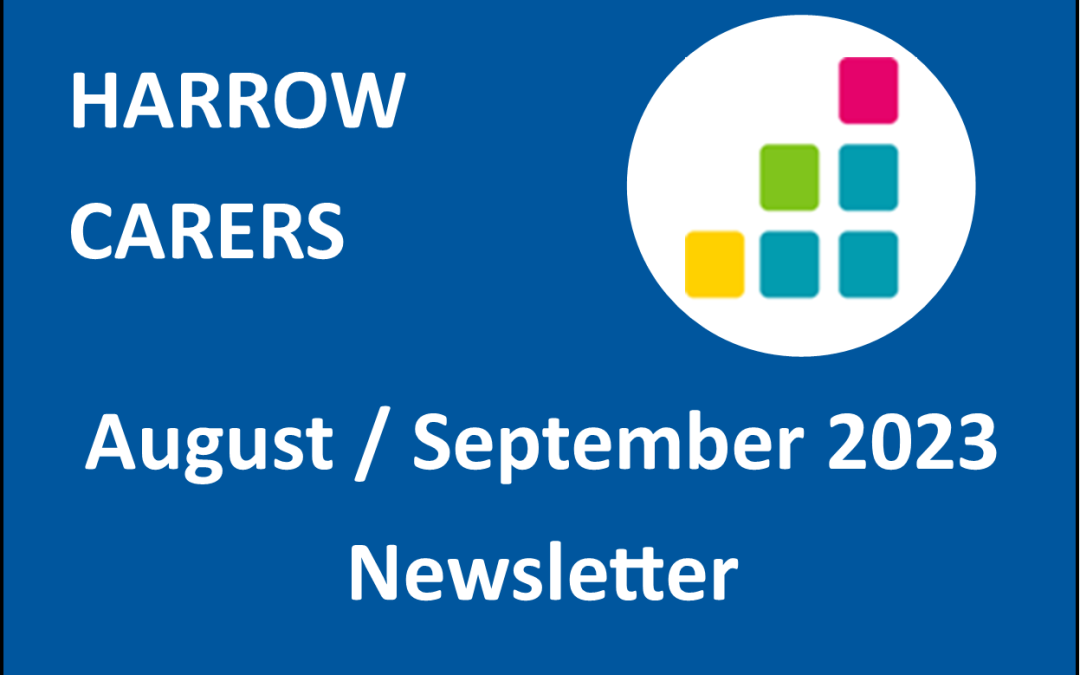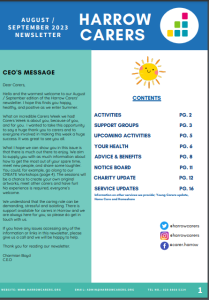
by Admin | 02.02.2024
The Harrow Carers News Bulletin contains all of the latest updates to help keep you informed about our work and upcoming activities.
If you do not currently receive our bulletins either by post or email but would like to, then please sign up to our newsletter below. Note that signing up for our email version can help us reduce printing and save the environment!
For previous issues please click here
Would you like to place an advert in our upcoming news bulletin? Call us at: 020 8868 5224 and request a media pack with more information and prices.


by Admin | 18.10.2023
Whether you are a new carer or have been caring for someone for a while, it’s important that you understand your rights and access the support that is available to you as soon as you need it. Carers Rights Day is about raising awareness of carers’ rights and entitlements, to help carers get the support they need.
To celebrate Carers Rights Day on Thursday 23th November we invite you to join us at Old Lyonians Ground where there will be presentations from experts covering important topics and there will also be an opportunity for you to speak with professionals and to ask questions specific to your need(s).
A review of the borough carers strategy and our AGM will also take place on this day. This will be a great opportunity to meet the Strategic Commissioning Manager, Robert Mackenzie-Wilson and the Social Care team from Harrow Council.
Thursday 23rd November 2023, 1pm – 4pm
At the Old Lyonians, 74 Pinner View, Harrow HA1 4QF

by Admin | 09.10.2023
The Harrow Carers News Bulletin is produced every couple of months and contains all of the latest updates to help keep you informed about our work and upcoming activities.
If you do not currently receive our bulletins either by post or email but would like to, then please sign up to our newsletter below. Note that signing up for our email version can help us reduce printing and save the environment!
For previous issues please click here
Would you like to place an advert in our upcoming news bulletin? Call us at: 020 8868 5224 and request a media pack with more information and prices.


by Admin | 04.08.2023
The Harrow Carers News Bulletin is produced every couple of months and contains all of the latest updates to help keep you informed about our work and upcoming activities.
If you do not currently receive our bulletins either by post or email but would like to, then please sign up to our newsletter below. Note that signing up for our email version can help us reduce printing and save the environment!
For previous issues please click here
Would you like to place an advert in our upcoming news bulletin? Call us at: 020 8868 5224 and request a media pack with more information and prices.


by admin | 01.10.2021
After taking some time to care for somebody, it can be difficult getting into the habit of having more free time to yourself and wondering how to get into work. There are a lot of emotions you might run into whilst trying to find a job, from worrying about the caring you were previously doing and how to fulfil your time, to wondering what it is you want to start doing again, it might perhaps be something brand new, or could be in an industry you have worked before?
To kick off your job search, whether it is paid or unpaid, it is worth reflecting on the skills you have gained from your role as a carer, and what it has taught you. Additionally, it is also important to highlight where you see your new role taking you, and thinking about the following questions:-
– how can you best apply these skills you acquired being a carer to the role you see yourself doing?
– when do you find yourself most happy? Take this into consideration when you are applying for new roles
– Where do you see yourself in 5 years’ time? Consider this both professionally, and personally
Once you have an idea of which avenue you would like to take, it would be helpful to research search various job profiles of what is usually required to then integrate into your CV and whilst talking to recruiters. Creating a LinkedIn profile is also super helpful, as you have direct access to jobs that are available and can also make yourself directly available to both relevant recruiters and companies who have roles available.
A few LinkedIn tips:-
– Always have a profile photo
– Change your settings to allow recruiters/companies to message you, should they have relevant roles available
– Write a short biography for your profile which aligns to the roles you see yourself fulfilling
Emotionally, it can be difficult getting back into work, and starting a new routine, especially after dedicating so much of your time to somebody else, however it is also important to look after yourself. It is important to find what is right for you and whilst job searching and beginning a new routine may be challenging, it will be beneficial in the long-run. This does not mean we dismiss any feelings of being nervous, scared and anxious, it does however, mean that we find ways of dealing with these negative feelings; this could be exercise, meditation, cooking, reading. Everybody is different, everybody is on their own individual path, and it is important to focus on yours, get yourself where you want to be, and enjoying the journey.
Getting back into work By Priya Tank

Working for Carers is a London-wide project that supports unpaid carers, aged 25 or over, to move closer to employment. The project is led by Carers Trust and delivered by its network of partners across London. Working for Carers is funded by the European Social Fund and The National Lottery Community Fund.

by admin | 19.07.2021
As the nation is moving into step four of the easing of lockdown, the government is removing COVID-19 prevention measures as we try and return to normal life.
As of July 19th, wearing masks in most public spaces will no longer be a legal requirement but the government is still asking people to take caution and responsibility for keeping themselves and others safe from infection.
Guidance published by the government says they “expect and recommends that people continue to wear a face covering in crowded, enclosed spaces.”
This guidance also applies to factories, construction sites, offices and close contact services like hairdressers. Businesses will now be responsible for making and enforcing any face mask rules from Monday 19th July, if they deem necessary.
Here are some of the main operators and places that have specified their rules on face coverings:
Bars, pubs and restaurants
Pub chains like Wetherspoons have said customers are no longer required to wear masks, but they still require staff to wear face coverings in certain cases.
Other famous pubs like Greene King have promised that punters will be allowed to walk up to a bar and order a pint, without being asked to wear a mask. Both pubs also confirmed that they will no longer use the Test and Trace app to check customers for COVID symptoms.
Masks will also no longer be obligatory in public spaces. This means those dining at restaurants will be able to do so freely without wearing a mask.
Supermarkets
Supermarkets like Tesco and Sainsbury’s will be encouraging workers and customers to continue wearing face coverings if they can. Others like Lidl will have signs at entrances to remind shoppers that mask wearing is recommended by the government.
How does removing the preventive measures affect carers?
Getting vaccinated
All eligible unpaid carers are in Priority Group 6 and should have no been invited for a vaccine. If you are an unpaid carer, check here if you’re eligible for the vaccine.
Alternatively, give Harrow Carers a call at 020 8868 5224, and we’d be delighted to find out for you.
Support
As a carer, it’s vital you receive support and you know what’s available to you.
You may also be entitled to additional benefits as a carer that you may not be aware of. Give us a call at 020 8868 5224 if you’re unsure, as you may be missing out on financial support.
You don’t need to feel guilty about accepting help. Remember that there is only so much you can do – try to accept that sometimes you may need help.
Personal protective equipment (PPE)
If you are a carer, it may be important to take some precaution measures as you don’t want to endanger the person you are caring for.
If you are also transitioning away from remote work, the government are offerring free PPE for COVID-19 needs to unpaid carers who don’t live with the person they care for. PPE is equipment that will protect you against health or safety risks at work. If you don’t live with the person you caring for, it is recommended that you wear PPE when delivering care.
Maintaining relationships with family and friends
Now that restrictions have been lifted, we may eventually want to connect with our friends and family again (not through Zoom anymore!)
Keeping in contact with your friends and family can be a great way to let off steam. You can talk about your emotions and what you’re going through. If you don’t feel like talking, you could catch a movie or even attend a fitness class.
As always. we’re always here to help. If you are a carer and unsure about how you’ll cope after the pandemic, call us on 020 8868 5224 for free consultation
Working for Carers is a London-wide project that supports unpaid carers, aged 25 or over, to move closer to employment. The project is led by Carers Trust and delivered by its network of partners across London. Working for Carers is funded by the European Social Fund and The National Lottery Community Fund. Contact Working for Carers on 020 8868 5224 Ext 218/208.











